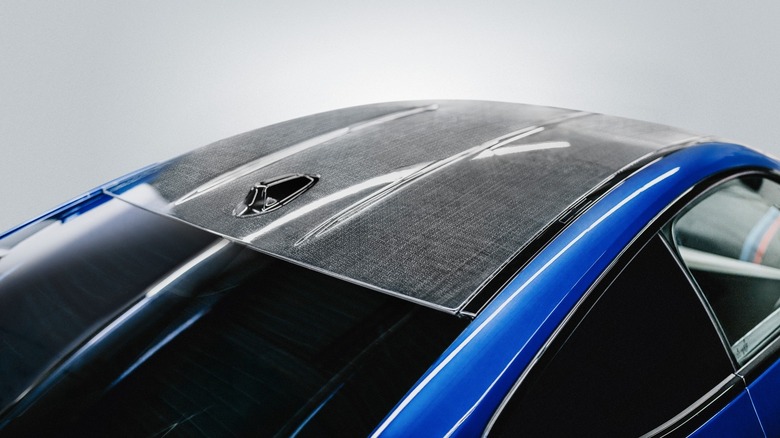
Rowe Racing claimed BMW's first overall victory in five years at the Nürburgring 24 Hours last Sunday. A record crowd of 280,000 spectators saw the white-and-yellow No. 94 BMW M4 GT3 Evo cross the finish line first ahead of a field of 140 cars. The ultimate test in motorsport also offered the Munich-based automaker the opportunity to trial natural fiber composites on a lower-class M4 in competition. BMW hopes that racing will prove that the material could be a sustainable replacement for carbon fiber.
The natural fiber-clad BMW M4 GT4 Evo was built in collaboration with Bcomp, a Swiss natural fiber producer. BMW first partnered with the company in 2019, when significant swaths of carbon fiber on the M4 GT4 were scrapped in 2022. The dashboard, center console, hood, front splitter, doors, trunk and rear wing were all constructed out of renewable high-performance flax materials. However, the roof was left untouched. This year, BMW announced that natural fiber composites now meet the homologation requirements for roof structures on production vehicles. Franciscus van Meel, BMW M CEO, said in a statement:
"Natural fiber is an innovation that perfectly exemplifies BMW M's claim 'Born on the racetrack. Made for the streets.'. This is why we are delighted to confirm the series maturity of these materials, a breakthrough we achieved with our official #BMW M Motorsport partner Bcomp. We are now looking forward to the use of these materials in future BMW M product ranges."
 BMW
BMW
BMW claims that replacing carbon fiber with natural fiber in roofs across the automaker's portfolio will reduce carbon emissions by around 40%. The swap will also be a simple solution to the dilemma of disposing carbon fiber. Racing fans are well aware that carbon fiber splinters during crashes. However, the same thing happens when carbon fiber is left to rot in a scrapyard. The resin that holds the carbon fiber together will wear away, and the material will shred tiny fibers that could hurt people when inhaled or touched. It's the reason why the European Union considered banning the material before industry interests lobbied for an about-face.
Natural fiber has seen better acceptance in motorsport, where jagged carbon fiber debris can cut tires, ruining races and potentially causing crashes. Bcomp produced natural fiber bodywork for BMW's Formula E team in 2019. The Swiss company has since partnered with the Super Formula Championship in Japan to develop hybrid 70% flax, 30% carbon fiber bodywork for its current generation of cars.
















